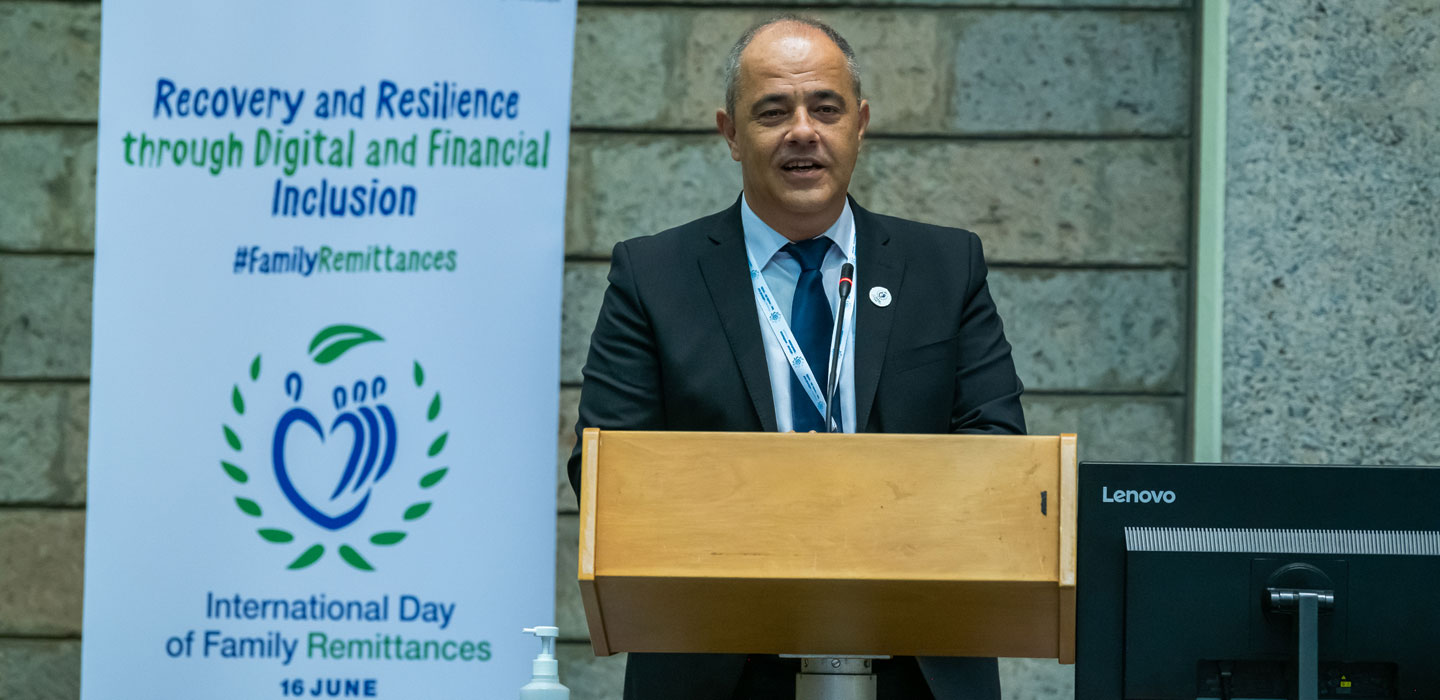“We need to change our mindset, diaspora and migrant workers are crucial development partners,” says IFAD expert
IFAD Asset Request Portlet
Asset Publisher
“We need to change our mindset, diaspora and migrant workers are crucial development partners,” says IFAD expert
16 June 2023
Nairobi, 16 June 2023 - Today, 16 June, marks the International Day of Family Remittances, led by the UN’s International Fund for Agricultural Development (IFAD). We spoke with Pedro de Vasconcelos, Manager of the Financing Facility for Remittances at IFAD. De Vasconcelos is a global leader in remittances and diaspora investments.
Q. What does the increasing number of families receiving remittances in the world mean?
A. Since the early 2000s, we have been looking at the phenomenon of people sending money back home. We were surprised at how much money migrants were sending to their families: US$ 200 every other month, on average. The total amount is actually incredible in terms of what it represented then for the economies of the receiving countries. And it still is.
Last year, US$647 billion was sent in remittances to low- and middle-income countries. The ODA (Official Development Assistance) to these countries and foreign direct investment combined are less than what migrants send to their loved ones back home. And remittances keep rising every year, even in times of crisis. However, remittance flows are hidden in plain sight. We have an interest in this phenomenon because half of the money goes to poor rural areas worldwide, where we believe the money is most needed.
How can families use these funds more profitably?
One misconception around remittances is that they are just for consumption. This couldn't be farther from the truth. Remittances are used to put food on the table and address poverty among many migrants’ families. Remittances send kids to school, pay the household and medical bills, enable gender equality and even help to address climate issues. Migrants make sacrifices when leaving their loved ones and seeking better opportunities for themselves and their families abroad. Some remittances are used to fund farm and non-farm activities that generate income, and small and medium size enterprises. We work to leverage funds used for this purpose and to better implement financial inclusion for the most vulnerable people.
What does the future hold for migrants and remittance families vis-à-vis the 2030 development agenda?
We believe that remittance families are the human face of globalization. What we're seeing today is that the flows and migration patterns continue to increase. In the post-COVID period, remittances have become even more important as a source of external financing. They have proved to be resilient. In 2022, remittance flows increased by 8 per cent. In turn, migration flows are at record levels in recent history. There is an increased demand in labour and migrants will respond to that demand as they need to support and provide for their loved ones back home.
What are migrant workers’ needs? How are IFAD’s efforts helping these families make the most out of their remittances?
They need more options to use their funds. IFAD is helping with access, making it easier for remittances to be delivered faster, cheaper and more safely. And once the money arrives, we can help to create more options so that people make the most out of the money received. And that's why we see, particularly in rural development and rural transformation, the potential that remittances could have if they were channelled and leveraged through rural financial services. This means savings, credit or insurance. Very simple services that many millions of remittance-receiving families have no access to. And this can be life-changing for these families and the communities where they live.
What's the role of diaspora and how is IFAD helping diaspora to invest back in the countries of origin?
Some migrant workers may not be sending remittances, but they nevertheless accumulate savings and want to support the communities where they come from. This support has evolved beyond the classic giving money away to build a school or a hospital. This philanthropic approach still exists and is very good to have it, but diaspora abroad is willing to invest, gain a return on investment, and reinvest. This is diaspora impact investment.
We need to change our mindset: diaspora and migrant workers are crucial development partners. It's crucial for the public sector, governments, and international organisations to understand, acknowledge, and work in tandem to respond to the needs of migrants and their families back home, in a coordinated way. All this will work if the private sector recognizes that there is a chance to make money. It's a win-win. Migrants and their families need more services that the private sector is not yet offering to them. But they could and it would be a viable business. It's just a mindset change. We need to create connections to enable trust and investments. For instance, Southern Europe made very good use of their migrants, and banked them and their families, and connected them to other services.
Can you explain how IFAD is helping Diaspora invest in their countries of origin?
IFAD addresses key challenges such as lack of trust, information or capacity on both sides. For instance, investing in Mali right now is very difficult because of the current situation. Yet the diaspora is not quitting on their loved ones or their country of origin. Another example is Somalia, where we delivered our biggest, most successful project at a time when donors, including IFAD, were unable to invest in projects. Diaspora was not only sending money but also investing. We simply facilitated investments. We understood the challenges that diaspora was facing and we supported those investments in terms of capacity. There's a myriad of other issues for diaspora to invest, but it's doable.
Today closes the Global Forum for Remittances, Investment and Development. What is the relevance of this Forum?
The Forum has been a preamble to the discussion we will have at the United Nations General Assembly Summit in September that focuses on the SDG Agenda. For over three days we've been highlighting the importance that remittances have for the sustainable development agenda, making clear the role that migrants and their families have. One of the topics that is extremely interesting is the link with climate adaptation. It is very humbling to know that investments in agriculture coming from migrant remittances, represent at least four times the global aid for agriculture.
What is the main takeaway of the Forum that you will bring to the SDG Summit in September?
Recognition. It's a very simple word and it doesn't cost anything, and it is the solution. Recognising that this is a win-win, recognising that migrants contribute extensively, let's just help them do better. Let's not just look at their money, let's keep the human perspective alive.
When we will interview you the next International Day of Family Remittances, what would be the news that you would like to give?
I would like to say that we are no longer discussing the relevance of remittances. Remittances are key. We know that they are a lifeline for hundreds of millions. We saw it during the pandemic. Financial inclusion is one of the biggest development opportunities that remittances represent for developing countries in low- and middle-income countries. Yet we still need financial inclusion policies that include remittances, like we saw with microfinance years ago.
I hope that we will have contributed more substantially with the SDGs and that member states will take additional action. I also hope that we will see financial institutions looking at remittance families as clients worth of services, and governments and development organizations considering them crucial development partners.
Press release No.: IFAD/41/2023
IFAD is an international financial institution and a United Nations specialized agency. Based in Rome – the United Nations food and agriculture hub – IFAD invests in rural people, empowering them to reduce poverty, increase food security, improve nutrition and strengthen resilience. Since 1978, we have provided more than US$24 billion in grants and low-interest loans to fund projects in developing countries.
A wide range of photographs and broadcast-quality video content of IFAD’s work in rural communities are available for download from our Image Bank.
